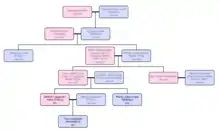Curie family
The Curie family is a Polish and French family with a number of illustrious scientists. Several members were awarded the Nobel Prize, including physics, chemistry, or the Nobel Peace Prize. Pierre (French) and Marie Curie (Polish) and their daughter Irène Joliot-Curie, are the most prominent members.[1][2][3][4][5][6][7][8][9][10][11][12]
| Curie family | |
|---|---|
| Current region | Paris, France |
| Place of origin | Paris, France |
| Members | |
| Connected families | |
| Distinctions | |
Family Genealogy

Family tree
Paul Curie (1799–1853), physician, humanist
x Augustine Hofer (1805–1883), a descendant of the famous scholar and mathematician Johann Bernoulli (1667–1748).
- Eugene Curie (1827–1910), doctor
x Sophie-Claire Depouilly (1832-1897).- Jacques Curie (1855–1941), physicist
x Marie Masson (1856–1945).- Maurice Curie (1888–1975), physicist.
- Daniel Curie (1927-2000), physicist.
- Maurice Curie (1888–1975), physicist.
- Pierre Curie (1859–1906), physicist, Nobel Prize in 1903.
x Marie Skłodowska Curie (1867–1934), physicist, chemist, Nobel Prize in 1903 and in 1911.- Irène Joliot-Curie (1897–1956), physicist, Nobel Prize in 1935
x Frédéric Joliot-Curie (1900–1958), physicist, Nobel Prize in 1935.- Pierre Joliot-Curie (1932), biologist
x Anne Gricouroff, biologist, daughter of Georges Gricouroff and Colette Rodet.- Marc Joliot (1962), neuroscientist.
- Alain Joliot (1964), biologist.
- Hélène Langevin-Joliot (1927), nuclear physicist
x Michel Langevin (1926–1985), physicist, son of André Langevin and Luce Dubus, grandson of Paul Langevin and Jeanne Desfosses.- Françoise Langevin-Mijangos x Christian Mijangos.
- Yves Langevin (1951),[13] astrophysicist
- Pierre Joliot-Curie (1932), biologist
- Ève Curie (1904–2007), writer, journalist, pianist
x Henry Richardson Labouisse, Jr. (1904–1987), American diplomat, Nobel Peace Prize on behalf of UNICEF in 1965.
- Irène Joliot-Curie (1897–1956), physicist, Nobel Prize in 1935
- Jacques Curie (1855–1941), physicist
- Eugene Curie (1827–1910), doctor
See also
References
- "Marie Curie's Immediate Family Won a Total of Five Nobel Prizes". Today I Found Out. 2011-11-07. Archived from the original on 2017-01-17. Retrieved 2017-08-06.
- "Marie Curie Biography - life, family, children, wife, school, mother, young, book, information, born, husband". www.notablebiographies.com. Archived from the original on 2017-06-27. Retrieved 2017-08-06.
- "Curie family - Students | Britannica Kids | Homework Help". kids.britannica.com. Retrieved 2017-08-06.
- "The Nobel Prizes: A family tradition - USATODAY.com". usatoday30.usatoday.com. Archived from the original on 2015-03-11. Retrieved 2017-08-06.
- "Nobel Prize Facts". www.nobelprize.org. Archived from the original on 2017-07-08. Retrieved 2017-08-06.
- Pasachoff, Jay M. (2009-01-22). "When winning a Nobel Prize seems to run in the family". Nature. 457 (7228): 379. Bibcode:2009Natur.457..379P. doi:10.1038/457379b. ISSN 0028-0836. PMID 19158770.
- "Double Noble: The Magnificent Four Who Received The Nobel Prize Twice - OpenMind". OpenMind. 2015-12-11. Archived from the original on 2017-03-13. Retrieved 2017-08-06.
- English, By Jason. "Odd facts about Nobel Prize winners - CNN.com". www.cnn.com. Archived from the original on 2017-01-19. Retrieved 2017-08-06.
- "15 Women Who Have Won Science Nobel Prizes Since Marie Curie". 2017-03-21. Archived from the original on 2017-03-25. Retrieved 2017-08-06.
- "The 10 Noblest Nobel Prize Winners of All Time". Live Science. Archived from the original on 2017-03-16. Retrieved 2017-08-06.
- "Marie Curie". Biography.com. Archived from the original on 2017-03-06. Retrieved 2017-08-06.
- "Marie Curie: 7 Facts on the Groundbreaking Scientist". Biography.com. Archived from the original on 2016-12-08. Retrieved 2017-08-06.
- "Yves Langevin". Archived from the original on 2016-04-22. Retrieved 2016-04-09.
This article is issued from Wikipedia. The text is licensed under Creative Commons - Attribution - Sharealike. Additional terms may apply for the media files.